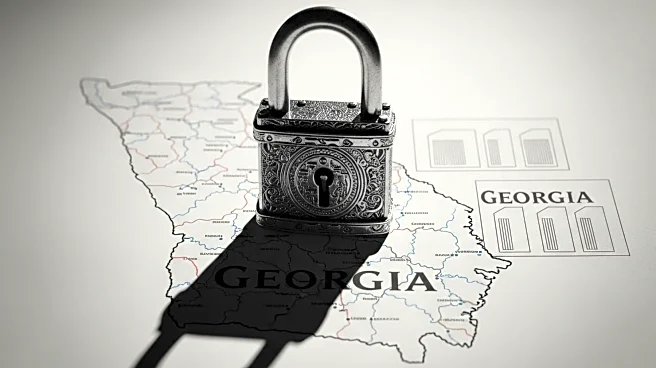What is the story about?
What's Happening?
The Immigration and Customs Enforcement (ICE) detention center located in Folkston, Georgia is undergoing expansion to become the largest immigrant detention facility in the United States. This facility, operated by a private prison corporation, will soon accommodate more than 4,000 detainees. The expansion reflects a significant increase in capacity, positioning Folkston as a central hub for immigration detention. The decision to expand the facility comes amid ongoing debates about immigration policies and the treatment of detainees. The facility's growth is expected to have substantial implications for the local community and the broader immigration system.
Why It's Important?
The expansion of the ICE detention center in Folkston is significant as it highlights the increasing reliance on detention facilities in managing immigration enforcement. This move may impact U.S. immigration policy, potentially leading to increased scrutiny and debate over the use of private corporations in operating such facilities. The expansion could also affect local economies, as the facility may create jobs and require additional resources from the community. However, it raises concerns about the conditions and rights of detainees, prompting discussions on human rights and ethical considerations in immigration enforcement.
What's Next?
As the facility expands, stakeholders including local government officials, community leaders, and immigration advocates are likely to engage in discussions about the implications of this development. There may be calls for increased oversight and transparency regarding the operations of the detention center. Additionally, the expansion could lead to legislative or policy proposals aimed at addressing the broader issues of immigration detention and reform. The community's response and potential protests or advocacy efforts could shape future actions and policies related to immigration enforcement.
Beyond the Headlines
The expansion of the Folkston detention center may have deeper implications for the U.S. immigration system, including the ethical and legal dimensions of detaining large numbers of immigrants. It could influence public perception and policy debates about the role of private corporations in immigration enforcement. Long-term shifts in immigration policy and enforcement strategies may be triggered by this development, affecting how the U.S. addresses immigration challenges.















